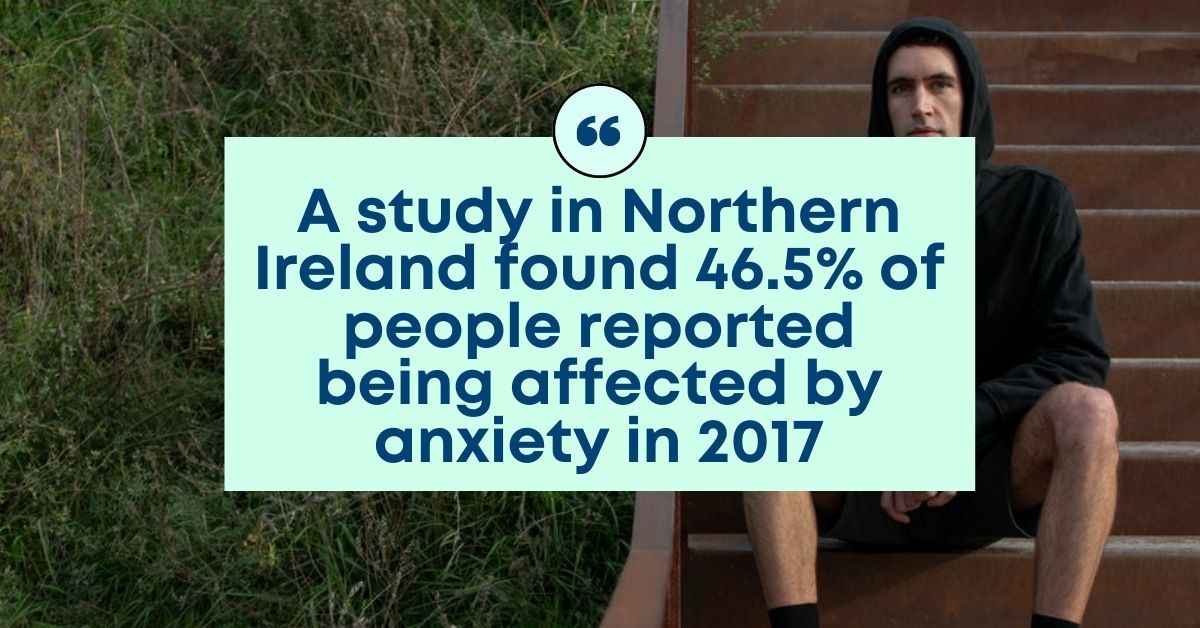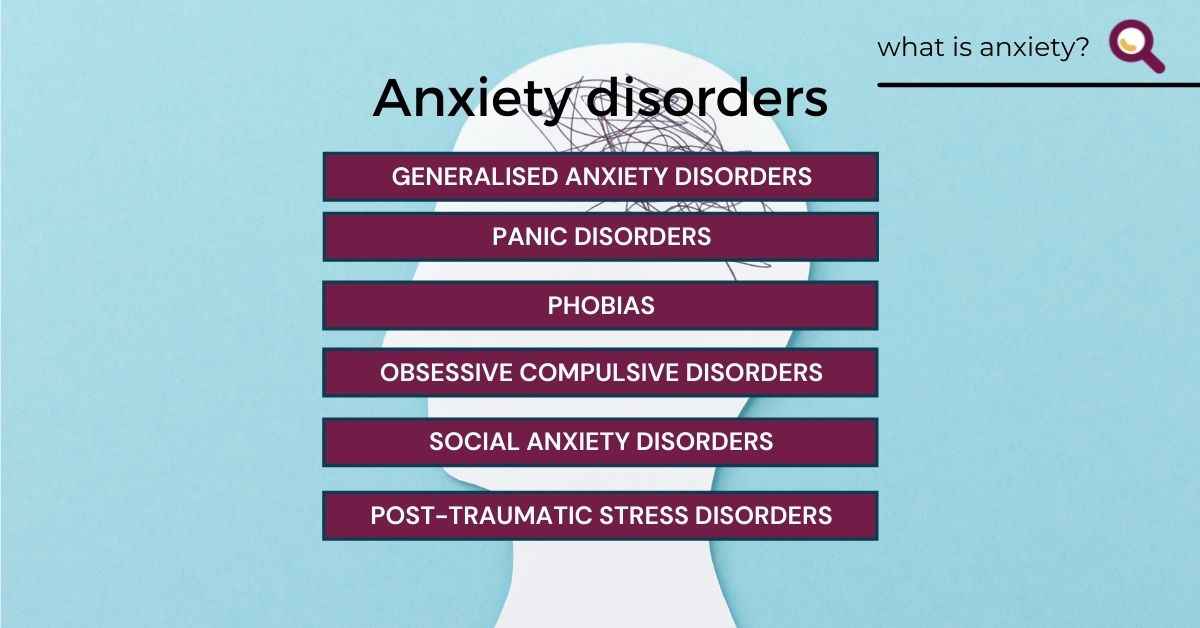Reviewed By Cara Swanston - Registered Member MBACP Adv. Dip.
What is Anxiety, Really?
26 July 2024
Anxiety is a common condition affecting anyone at any age.
Does your heart race with worry? Do you feel overwhelmed with day-to-day life, like everything seems too big or unmanageable? When anxiety is at its worst, it can leave us paralysed with fear, consumed with feelings of dread or stuck in patterns of stressful thinking.
Here’s what you need to know about anxiety, including how it can affect our lives and why anxiety happens in the first place.
What is anxiety?
Anxiety is a common condition affecting anyone at any age. In 2017, a study in Northern Ireland found 46.5% of people reported being affected by anxiety. But for something so pervasive, what is anxiety?
Anxiety is considered as fear, worry, uneasiness or nervousness, and for some people, anxiety might be a feeling relating to an activity or event. While it’s a feeling everyone will experience at some point in their lives, anxiety can be a debilitating condition when it feels out of control.
In some cases, anxiety disorders are a chronic condition which dramatically impacts a person’s livelihood because the symptoms are difficult to manage or they prevent someone from going about their day-to-day lives.

What does anxiety feel like?
Anxiety will feel different for everyone, but some common experiences of anxiety can include:
- An uneasy feeling in your stomach (butterflies, churning or nausea)
- Feeling dizzy or lightheaded
- A rapid heart beat
- Feeling suddenly flushed
- Sweating
- Feeling like there is a lump in your throat
- Having a sense of dread
- Remembering negative experiences often
- Worrying that the people around you are upset with you
- Feeling like you cannot stop worrying about what might happen
- Difficulty concentrating
- Trouble sleeping
When does anxiety become a problem?
When anxiety interrupts our ability to go about our daily lives or affects our quality of life, it can become problematic. Anxiety can become a problem if:
- Your anxieties feel out of proportion to the situation
- Your social contact is significantly reduced or you fear situations which might make you anxious
- Your worries feel distressing or trigger panic attacks
- Your anxiety lasts for a long time or feels out of control
- The symptoms of anxiety worsen

What are Anxiety Disorders?
Anxiety Disorders refer to a group of mental disorders characterised by feelings of anxiety and fear. These include generalised anxiety disorder (GAD), panic disorder, phobias, social anxiety disorder, obsessive-compulsive disorder (OCD) and post-traumatic stress disorder (PTSD).
Generalised Anxiety Disorders
Generalised Anxiety Disorder (GAD) means having persistent or uncontrollable worries or fears about everyday life. People with GAD often have difficulty coping with their worry and their symptoms, which include fatigue, irritability, stress-induced muscle pain, tension, insomnia or disrupted eating.
Panic Disorders
Panic Disorders are frequent panic attacks brought on suddenly by overwhelming feelings of anxiety. Sometimes panic attacks can happen without a trigger and they can be an unpleasant experience, which many people who have them live in fear of. During a panic attack a person might feel physical symptoms come on quickly and these include hyperventilation or struggling to breathe, heart palpitations, feeling disconnected from their surroundings, chest pain, nausea, shaking and sweating. When someone is having a panic attack, they might feel like they’re losing control, having a heart attack or about to faint.
Phobias
Phobias are overwhelming feelings of fear and anxiety related to specific situations, objects, activities or animals. Many people have fears about particular things, such as a fear of snakes or spiders, but a fear can become a phobia if your feelings are out of proportion to the danger or it hinders you from going about your daily life, participating in activities or socialising. Symptoms can also include physical symptoms like nausea, panic, shake or heart palpitations.
Obsessive Compulsive Disorders (OCD)
OCD is characterised by obsession and compulsions which dominate a person’s day, causing major distress. OCD significantly impacts someone’s quality of life as a person is overwhelmed by obsessive thoughts, which can cause them anxiety, or compulsive behaviour, such as repetitive activities, to the point they can’t function how they normally would.

Social Anxiety Disorders
A Social Anxiety Disorder means a person is overwhelmed in social situations and will avoid social spaces, such as social obligations or work, because their fear is too intense. Social Anxiety Disorder is more extreme than shyness and can cause a person to have similar symptoms to a panic attack.
Post-traumatic Stress Disorders (PTSD)
PTSD is where a person is affected by intense and overwhelming symptoms after experiencing something traumatic. It can involve reliving the experience, flashbacks or nightmares. Other symptoms include hyper-vigilance, difficult sleeping, avoidance of social situations, inability to concentrate, outbursts of anger and feelings of guilt or fear.
What causes anxiety?
Anxiety, fear and worry, although unpleasant, can be normal responses to certain situations and this reaction is called a Fight or Flight response.
Our Fight or Flight response is our body’s way of alerting us to potential difficulty or danger, whether it’s real or imagined. Our brain responds by releasing adrenaline and cortisol, which brings on symptoms of anxiety telling us to either flee from a situation or fight it. If you have an anxiety disorder, you might experience ongoing symptoms that last long after the threat is gone, which can make things feel worse than they are.
Anxiety can be influenced by a range of factors, including our genetics and lifestyle choices, including our routines, what we eat and the environments we’re exposed to, whether it’s a stressful work environment or a difficult home life. Some people may be predisposed to developing anxiety because of thinking patterns they developed as a child through learned behaviour or if their close relatives have a condition which they inherit.
Many people with anxiety seek support, whether it’s through a mental health support service, self help resources, speaking to someone through a helpline or getting one-to-one support, such as talking therapy, CBT, life coaching or creative therapies.
Get Inspired Further
lets talk about menopause
In simple terms, the menopause is when our hormone levels begin to change and we stop having periods. But it's so much more than that!
Vagus Nerve 3 Way Breath
A great exercise for enhancing vagal tone and initiating the relaxation/parasympathetic response reducing feelings of anxiety and overwhelm.
Lets talk about the Vagus Nerve
Let's dive into the fascinating world of the vagus nerve. Ever heard of it? If not, you're in for a treat because it's a big player in taking us from the stress response, back into the relaxation response.



